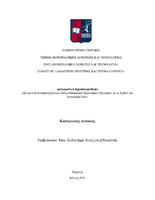| dc.contributor.advisor | Χατζηνταή, Νικολέττα | |
| dc.contributor.author | Καστρινάκης, Αντώνιος | |
| dc.date.accessioned | 2024-07-30T07:49:07Z | |
| dc.date.available | 2024-07-30T07:49:07Z | |
| dc.date.issued | 2024-07-25 | |
| dc.identifier.uri | https://dione.lib.unipi.gr/xmlui/handle/unipi/16644 | |
| dc.identifier.uri | http://dx.doi.org/10.26267/unipi_dione/4066 | |
| dc.description.abstract | Μεταξύ των διαφόρων ειδών μπαταριών, οι μπαταρίες ιόντων λιθίου (Li-ion) εμφανίζονται παγκοσμίως ως οι ταχύτερα αναπτυσσόμενες μπαταρίες, λόγω των πολλαπλών εφαρμογών τους στην βιομηχανία των ηλεκτρονικών και των οχημάτων και της μεγάλης ενεργειακής πυκνότητας που παρουσιάζουν. Η στροφή όμως της σύγχρονης αγοράς εντός των τελευταίων δεκαετιών προς πιο περιβαλλοντικά φιλικά υλικά, καθιστά επιτακτική την αξιολόγηση του περιβαλλοντικού αποτυπώματος των μπαταριών.
Η μπαταρία ιόντων λιθίου αποτελείται από σημαντικό ποσοστό ανακυκλώσιμων υλικών, τα οποία σπανίως επαναχρησιμοποιούνται για την κατασκευή νέων μπαταριών, και από υλικά που οδηγούνται σε χωματερές ή διαχειρίζονται ως επικίνδυνα. Η περιβαλλοντική αξιολόγηση της μπαταρίας ιόντων λιθίου που χρησιμοποιείται σε οχήματα, σύμφωνα με τις αρχές του οικολογικού σχεδιασμού, πραγματοποιείται μέσω του Ecodesign Pilot, εργαλείο το οποίο αξιολογεί ξεχωριστά κάθε στάδιο του κύκλου ζωής ενός προϊόντος.
Η παρούσα διπλωματική εργασία θα εξετάσει τον περιβαλλοντικό αντίκτυπο της μπαταρίας, για τον μετριασμό του οποίου θα αναλυθούν στρατηγικές που προτείνονται από το εργαλείο, αλλά θα προσδιοριστούν και οι αδυναμίες του Ecodesign Pilot, όπως και προτεινόμενοι τρόποι βελτίωσης. Για την πραγματοποίηση της μελέτης περίπτωσης αξιοποιήθηκαν δεδομένα από σχετικές διαδικτυακές πηγές, βάσεις δεδομένων και επιστημονικές μελέτες. | el |
| dc.format.extent | 83 | el |
| dc.language.iso | el | el |
| dc.publisher | Πανεπιστήμιο Πειραιώς | el |
| dc.rights | Αναφορά Δημιουργού-Όχι Παράγωγα Έργα 3.0 Ελλάδα | * |
| dc.rights.uri | http://creativecommons.org/licenses/by-nd/3.0/gr/ | * |
| dc.title | Συγκριτική εκτίμηση κύκλου ζωής μπαταριών ηλεκτρικών οχημάτων με τη χρήση του Ecodesign Pilot | el |
| dc.title.alternative | Comparative life cycle assessment of electric vehicle battery packs using Ecodesign Pilot | el |
| dc.type | Master Thesis | el |
| dc.contributor.department | Σχολή Ναυτιλίας και Βιομηχανίας. Tμήμα Βιομηχανικής Διοίκησης και Tεχνολογίας | el |
| dc.description.abstractEN | Among the multiple battery types, lithium-ion (Li-ion) batteries have emerged worldwide as the fastest growing batteries, due to their various applications in the electronics and automotive industries and their high energy density. However, the modern market’s shift within the last decades towards more environmentally friendly materials makes the evaluation of the environmental footprint of batteries imperative.
Lithium-ion batteries contain a significant percentage of recyclable materials, which are rarely reused in the manufacture of new batteries, and a smaller portion of materials that are landfilled or treated as hazardous. The environmental assessment of the vehicle lithium-ion battery, in line with eco-design principles, is carried out through Ecodesign Pilot, a tool that assesses each stage of a product's life cycle separately.
The present thesis will examine the environmental impact of the lithium-ion battery, for the mitigation of which strategies proposed by the tool will be analysed. At the same time, weaknesses of the Ecodesign Pilot tool will also be identified and possible ways of improvement will be suggested. For this case study, data from relevant online sources, databases and scientific studies were utilised. | el |
| dc.contributor.master | Βιομηχανική Διοίκηση και Τεχνολογία | el |
| dc.subject.keyword | Μπαταρίες | el |
| dc.subject.keyword | LCA | el |
| dc.subject.keyword | Κύκλος ζωής | el |
| dc.subject.keyword | Οχήματα | el |
| dc.subject.keyword | Υβριδικά | el |
| dc.subject.keyword | Πρώτες ύλες | el |
| dc.subject.keyword | Ecodesign | el |
| dc.subject.keyword | Plug-in | el |
| dc.subject.keyword | Ηλεκτρικά | el |
| dc.date.defense | 2024-07-25 | |



